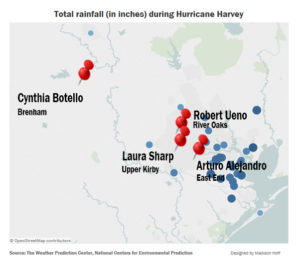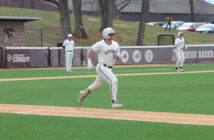It was the start of the 2017-18 academic year in South Bethlehem, but for a small population of Lehigh students, it wasn’t business as usual.
Fifteen hundred miles away, Hurricane Harvey roared through Texas and Louisiana, threatening to destroy their homes and harm their families. Pictures and videos on Snapchat and Facebook showed their towns completely under water, but there was nothing the students could do from the comfort of their dorm rooms.
 “Events like these make you realize your distance, and in a way, it feels powerless,” Cynthia Botello, ’17, ’18G, said.
“Events like these make you realize your distance, and in a way, it feels powerless,” Cynthia Botello, ’17, ’18G, said.
Botello, a political science graduate student and native of Brenham, Texas, said her mind was back home all week. Although her family only experienced damage to their yard and surrounding roads, she called them daily to check in.
“My Lehigh friends wanted to celebrate the fact that I was back, but the entire time I was just hearing that the hurricane was getting stronger and stronger, and it made me doubt why I was so far away from home,” Botello said.
Arturo Alejandro, ’20, said he was constantly on the phone with family and friends throughout the first week of classes.
Despite a busy schedule filled with chemical engineering courses, Alejandro said he felt responsible for making sure everyone back home on the East End of Houston was safe and still had electricity and running water. His family was unharmed and, to him, that’s all that matters. He said the rest of the material things they lost are just that — things.
Laura Sharp, ’20, said although her house wasn’t damaged, she found herself absorbing the stress of her family and neighbors. Her cousins, who didn’t have flood insurance, lost their home in the hurricane and are now living with Sharp’s aunt.
“My family is taking on their stress, and it’s been hard to see so many people scramble to find a home,” Sharp said. “They have to go back to work and back to school but also have nowhere to live and no belongings.”
Sharp lives five miles between two bayous in Upper Kirby, which is located about 10 minutes from downtown Houston. She said if her house had been just one block over, her family would have experienced major flooding.
Sharp’s parents and sister were stuck in their home for nearly four days because their street resembled a river. Her sister — a junior in high school — was out of school for a week and a half.
“I feel like there’s a much bigger sense of community now,” Sharp said. “Before, with everything going on politically, there was a big divide in Houston, but now everyone’s connected because everyone struggled.”
Although Botello appreciates her community coming together, she said she was “shocked” none of her friends were talking about the causes of Hurricane Harvey.
Botello scoured Facebook, and she said she never found any discussions about pollution or outrage over the proposed budget cuts to FEMA, the Federal Emergency Management Agency.
“It’s unheard of to bring that up in Texas,” Botello said. “I think it’s because we’re a very strong, loyal state, so discourse is very limited on what you can say and can’t say. People will look down on you and say, ‘Oh, you’re just one of those green folks.’”
Now that Hurricane Harvey has come and gone, Botello worries about how poor communities will recover. She hopes vulnerable victims will not succumb to scams or be forced to take out loans with ridiculous interest rates.
Sharp said she thinks poorer neighborhoods were more affected because they were less prepared.
“Where I live, people have a certain amount of money and to a certain extent, we were prepared to protect our houses,” Sharp said, “but some people don’t have a lot of money and weren’t able to bounce back as fast as we are.”
Robert Ueno, ’18, lives in Houston between the River Oaks and West University neighborhoods. He said he and his friends weren’t severely affected by the hurricane because they live in upper-class sections of Houston, which tend to be on the western side of the city.
Alejandro didn’t agree. He thinks it all depended on where the nearest bayou was, which isn’t a good indicator of socioeconomic status. He said rich and poor neighborhoods alike are located near bayous or other water outlets.
As for the response from the Lehigh community, all the students said their friends, professors and the administration have been supportive. Many offices on campus — Student Affairs, Financial Aid and for Botello, Graduate Studies — reached out to the students to check in.
“The response from the Lehigh community has been amazing,” Alejandro said. “It solidified why I chose to come to this school.”





Comment policy
Comments posted to The Brown and White website are reviewed by a moderator before being approved. Incendiary speech or harassing language, including comments targeted at individuals, may be deemed unacceptable and not published. Spam and other soliciting will also be declined.
The Brown and White also reserves the right to not publish entirely anonymous comments.